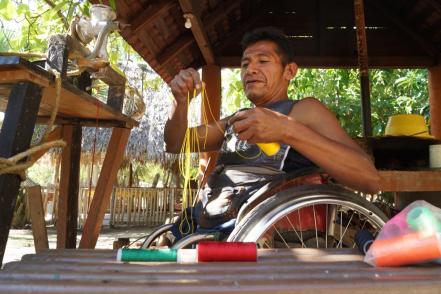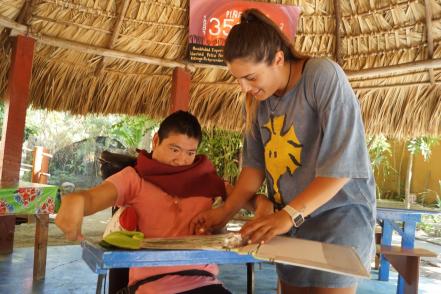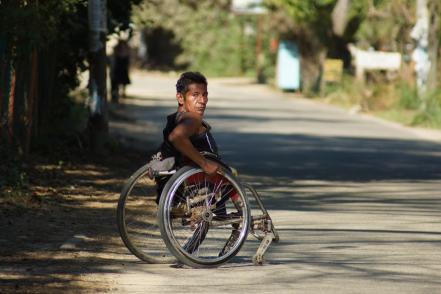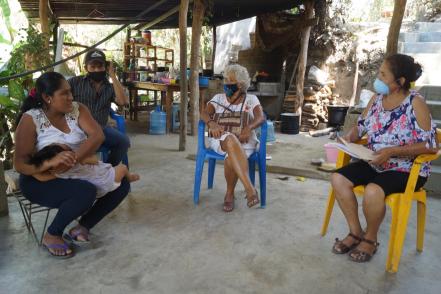Living with a disability: On the Oaxaca Coast, they teach that inclusion is born from the community
Piña Palmera Association, based in Zipolite, promotes 530 people with disabilities in the Oaxaca Coast; it also provides training for them to have an independent life
| Vivir con discapacidad: En la Costa de Oaxaca enseñan que la inclusión nace desde la comunidad Asociación Piña Palmera, con sede en Zipolite, impulsa a 530 personas con discapacidad en la Costa de Oaxaca; también les proporciona ... |
Pochutla.— The red, yellow and green threads are intertwined by patient and agile hands, and under the imperturbable gaze of Bartolomé Martínez , a 57-year-old man whom an accident 31 years ago left him paraplegic and for whom, due to lack of attention, his legs were amputated.
At the age of 16, Batolomé moved with his family to Zipolite , coming from Candelaria Loxicha. Nine years later, he was returning from the beach after his work as a farmer, when the heat and work made him thirsty.
He saw a palm tree and decided to climb to cut a coconut: a bad movement made him slip and fall from 12 meters high. Today, a steel bar supports your spine.
“I suffered from depression, I felt alone, insecure. I was scared in the chair, until five years later I was able to take care of myself, but I had already lost my leg ”.
Now, Bartolomé leads an independent life.
Two days a week he works cutting coconut for the civil association Piña Palmera , based in Zipolite.

He is also in charge of assembling toy birds that are hung, which are made and painted by other people who also have disabilities, his other source of income .
Like Bartolomé, more than 530 people with disabilities receive care, rehabilitation and training to achieve an independent life at Piña Palmera, a non-profit organization with no public funding that works with families and community actors to achieve the inclusion of people with disability.
The association was founded in 1984 by the American Frank Douglas , whose intention was to create a shelter for people with disabilities, after detecting the lack of attention to this sector. When he died a year later, his work was continued by Anna Johansson.

Flavia Esther Anua , who came to the organization 29 years ago and is currently the General Coordinator, relates that then they discovered that a shelter was not the appropriate space because the families did not understand the situation and did not take responsibility for their children, community, less.
"We thought about the best way to work with the community and with families so that people with disabilities themselves would stay in their surroundings," he recalls.
They then applied a methodology called Community Based Rehabilitation, which they later renamed Community Based Inclusion, which was initiated by the World Health Organization (WHO) in the 1960s.
The main idea was to make accessible in isolated communities, with a team of specialists, care for people with disabilities.
However, in Piña Palmera they lacked these specialists, since the communities they work with are isolated, rural and with difficult economic conditions.
“We have been building options for people with disabilities in our environment from the same strategy. The ultimate goal is to change attitudes and change the environment to promote the inclusion of people with disabilities ”.
The methodology goes beyond the person and their family, it includes all community actors, teaching and medical personnel, authorities, transporters and people with businesses.

It has also developed a system that allows the association to grow to be self-sustaining and generate job options. They currently carry out various activities to promote inclusion processes . They also have workshops run by people with disabilities who have participated with them and have an advanced process; it is they who train the new ones.
Thus, they have a carpentry shop, a workshop for making notebooks with recycled paper, one for toys, and another for beauty products based on coconut oil - ranging from shampoo, liquid and solid soap, toothpaste and mosquito repellants.
All these products are sold in a store with a fair trade approach.
There is also no prevention during pregnancy
It took Sofía Pérez and her husband Florencio five months to realize that their baby Ingrid had trisomy 21.
“We had her in the Pochutla hospital and there they told us it was normal. My husband didn't earn much because he was a bricklayer's assistant. I never went to the midwife for lack of money. At four months his head was drooping and he was unable to eat. A lady told me she was sick, I said no, ”she recalls.
His home is in Corcovado Petaca, a town in San Pedro Pochutla. The members of Piña Palmera visit them because they have not returned to therapy for the girl for more than a month. While they talk, they take the opportunity to give advice on a rehabilitation therapy that they can do from home.
Sofía and Florencio are engaged in commerce: they buy fish on the coast and then go to municipalities in the Sierra to sell it. There they buy products from that region to resell them in Pochutla; what they earn is barely enough for their food and they have to work every day.
“Here, in these communities, the incidence of people with disabilities is very high, because health care for women since pregnancy does not exist.

“There is no adequate information, nutrition is very low because the economy is very low. They have their children close to home, not in hospitals because they don't even have time to get there and they are sometimes very far away. All these circumstances increase the number of people with disabilities, in addition to the use of toxins for crops ”, explains Flavia Anau.
The Piña Palmera association cares for 335 people with disabilities in Zipolite, where its facilities are located; in Puerto Escondido, where they come from various communities; in Santo Domingo de Morelos and in San Francisco Cozoaltepec.
Among the challenges, they point out, they find that sometimes people with disabilities just want to receive a pantry; the families who believe that "everything is solved with a magic wand" and the authorities who are not responsible.
Given this, the association must carry out informational actions in Zapotec to guarantee that there is a change in attitude from the person with a disability and their family, and thus push all community actors.
The difficulties are always the conditions in which those with disabilities live: in an irregular geography that presents transport problems and a poor economy.
Both problems have intensified with the pandemic, because neither they nor their families have been adequately informed. "And if they cannot participate, they are increasingly discriminated against," she says.
“In education, for example, they were completely left out. We are in an indigenous rural environment and it becomes a very complex issue. Health is denied for people with disabilities. All this is setting people with disabilities adrift ”.
Flavia Anua maintains that in Mexico public policies are made on a desk and do not correspond to reality, since they only consist of “scholarships”. Public policy, he says, must guarantee equal opportunities, accessible transportation, health, adequate and accessible school. "In all this, we are still in diapers."
No comments:
Post a Comment
Thank you. Comments are welcome.
ivan